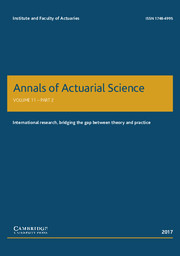Article contents
On unbalanced data and common shock models in stochastic loss reserving
Published online by Cambridge University Press: 27 July 2020
Abstract
Introducing common shocks is a popular dependence modelling approach, with some recent applications in loss reserving. The main advantage of this approach is the ability to capture structural dependence coming from known relationships. In addition, it helps with the parsimonious construction of correlation matrices of large dimensions. However, complications arise in the presence of “unbalanced data”, that is, when (expected) magnitude of observations over a single triangle, or between triangles, can vary substantially. Specifically, if a single common shock is applied to all of these cells, it can contribute insignificantly to the larger values and/or swamp the smaller ones, unless careful adjustments are made. This problem is further complicated in applications involving negative claim amounts. In this paper, we address this problem in the loss reserving context using a common shock Tweedie approach for unbalanced data. We show that the solution not only provides a much better balance of the common shock proportions relative to the unbalanced data, but it is also parsimonious. Finally, the common shock Tweedie model also provides distributional tractability.
Keywords
- Type
- Review
- Information
- Copyright
- © Institute and Faculty of Actuaries 2020
References
- 1
- Cited by


